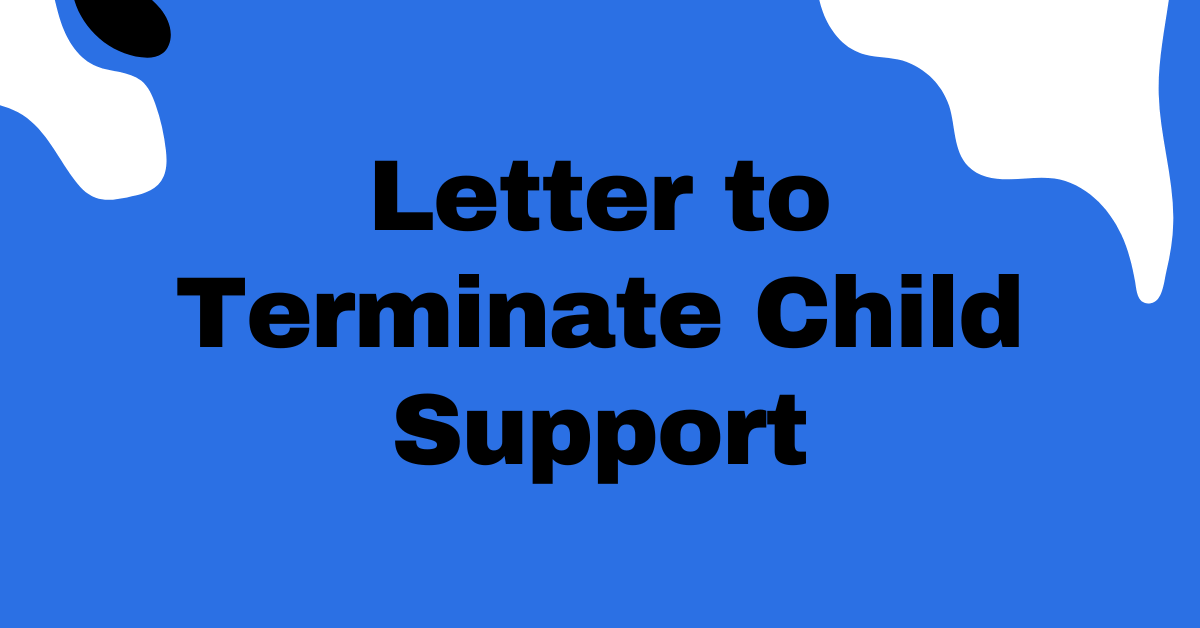In the complex landscape of legal communications, crafting a letter to terminate child support is a matter of precision and clarity. This article aims to demystify the purpose and intricacies of such letters, providing a straightforward guide for those seeking to navigate this aspect of family law.
Child support termination letters serve the vital purpose of formally notifying relevant parties about the cessation of child support payments. The primary objective is to communicate this decision clearly, ensuring legal compliance and preventing any misunderstandings between the parties involved. Whether it’s due to changed circumstances or the reaching of a predetermined age, these letters play a crucial role in formalizing the conclusion of financial support responsibilities.
As you delve into this article, we recognize the challenges of composing such a letter. To aid you in this process, we will be sharing templates, examples, and samples of letters to terminate child support. These resources are designed to empower you with practical insights and language, making it easier for you to articulate your intentions accurately. Let’s embark on this journey together, unraveling the complexities and streamlining the communication involved in terminating child support.

Sample of Letter to Terminate Child Support
[Your Name]
[Your Address]
[City, State, ZIP Code]
[Date]
[Recipient’s Name]
[Recipient’s Address]
[City, State, ZIP Code]
Subject: Notice of Termination of Child Support
Dear [Recipient’s Name],
I trust this letter finds you well. I am writing to formally notify you of my decision to terminate child support payments, effective [insert date]. This decision has been carefully considered, and I believe it is in the best interest of all parties involved.
Due to [provide a brief explanation of the reason for termination, such as changed circumstances or the child reaching the age of majority], I find it necessary to conclude the financial support arrangements previously established. This letter serves as an official notice of termination in accordance with applicable laws and regulations.
I want to assure you that this decision is not made lightly, and I remain committed to maintaining an amicable relationship for the well-being of our child. I am open to discussing any necessary adjustments to visitation or other arrangements to ensure a smooth transition.
Enclosed with this letter, you will find supporting documentation and a proposed plan for transitioning out of the child support arrangement. I believe that clear communication and collaboration will be essential during this period.
If you have any questions or concerns, please do not hesitate to reach out. I am willing to engage in a constructive dialogue to address any issues that may arise during this transition.
Thank you for your understanding and cooperation in this matter. I look forward to working together to ensure the continued well-being of our child.
Sincerely,
[Your Name]
How to Write a Letter to Terminate Child Support

1. Understanding the Purpose: Why Terminate Child Support
Child support termination is a significant decision, and it’s crucial to comprehend the reasons behind it. Before initiating the process, evaluate the circumstances leading to this decision. Whether it’s due to a change in financial situation, the child reaching adulthood, or other factors, clarity on the purpose is key.
2. Legal Considerations: Know Your Rights and Responsibilities
Writing a letter to terminate child support involves legal aspects. Familiarize yourself with the relevant laws and regulations in your jurisdiction. Understanding your rights and responsibilities ensures that your letter is not only persuasive but also adheres to legal requirements.
3. Crafting the Letter: Precision and Diplomacy
The actual composition of the termination letter demands precision and diplomacy. Clearly state the reasons for termination, providing supporting details without unnecessary elaboration. Maintain a respectful tone, emphasizing the well-being of the child and expressing a willingness to cooperate.
4. Documentation: Supporting Your Decision
Include any pertinent documents that support your decision to terminate child support. This might involve financial statements, legal documents, or other evidence. Proper documentation strengthens your case and demonstrates transparency.
5. Addressing Emotional Implications: Sensitivity Matters
Terminating child support can have emotional implications for all parties involved. Address the emotional aspect in your letter with sensitivity. Acknowledge the potential impact on the child and express a commitment to maintaining a positive and cooperative relationship.
6. Proposed Transition Plan: Ensuring a Smooth Process
Offer a proposed plan for transitioning out of the child support arrangement. This could include details on visitation, communication, or any other relevant arrangements. A well-thought-out transition plan helps facilitate a smoother process for all parties.
7. Seeking Legal Advice: When in Doubt, Consult a Professional
If you find the legal aspects or the writing process challenging, don’t hesitate to seek professional advice. Consulting with a family law attorney can provide clarity on legal requirements and ensure that your letter is well-structured and legally sound.
Remember, the goal is to communicate your decision effectively while maintaining a respectful and cooperative tone throughout the process.
FAQs about a Letter to Terminate Child Support
Many individuals navigating the complexities of terminating child support often have common questions about the process. Let’s address some of these frequently asked questions to provide clarity on this sensitive subject.
1. How can I legally terminate child support?
Legally terminating child support involves a formal process. You need to submit a request to the family court, explaining the reasons for termination. It’s advisable to seek legal counsel to ensure you follow the proper legal procedures.
2. What valid reasons justify terminating child support?
Valid reasons for terminating child support may include a change in financial circumstances, the child reaching adulthood, or other significant life changes. The court evaluates each case individually, considering the best interests of the child.
3. Is it possible to terminate child support without going to court?
In some cases, parties may reach a mutual agreement outside of court, leading to the termination of child support. However, it’s crucial to formalize such agreements legally to avoid future complications. Consulting with a family law attorney is recommended.
4. How long does the process of terminating child support take?
The duration of the process varies based on jurisdiction and individual circumstances. Generally, it may take a few weeks to several months. Seeking legal advice and efficiently providing required documentation can expedite the process.
5. Can child support be terminated retroactively?
Terminating child support retroactively is challenging. The court usually addresses modifications or terminations from the date of filing. It’s essential to act promptly and follow legal procedures to avoid additional financial obligations.
Navigating the process of terminating child support involves legal intricacies, and seeking professional guidance is pivotal in ensuring a smooth and legally sound transition.
RELATED:
